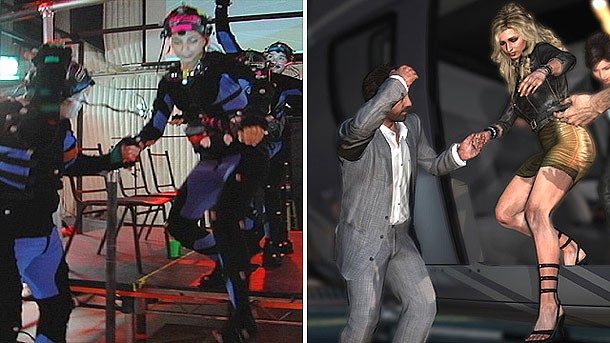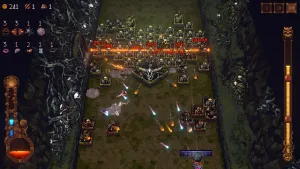The Potential Voice Actor Strike Explained

This week has seen a flurry of news, but no story has been bigger than the looming SAG-AFTRA strike over voice actor working conditions. Because of a media blackout, we don’t have all the details. In fact, everything we’ve heard has been from the union’s perspective.
We’ll continue to update this story (originally published on September 25, 2015) as more information is made available, but we felt it important to put forward everything we know in digestible form.
The Current Status (Updated: June 6, 2016)
On May 26, SAG-AFTRA announced it has submitted a request to the California Occupational Safety and Health Standards board to meet regarding employment situations that cause excessive vocal stress. The request comes after the union put out a call in February for testimonials about the impact of vocal stress on actors.
"Many of the stories we heard from members are truly disturbing," the union says. "Among the injuries reported were instances of performers losing their voices for up to six months, tasting blood during their session, fainting or nearly fainting, and damage resulting in a permanent change to vocal range."
The union is encouraging actors that have suffered vocal stress on the job in the last six months to file a complaint with OSHA. A copy of the letter from SAG-AFTRA to the standards board can be read here.
Negotiation 101
Collective bargaining is a dance. It is never straightforward, and every piece of a well-crafted proposal is inflated. The reason for this is that negotiations are never about getting everything you want. They are about getting the things most important to you. That means you need to be ready to give up some of your requests. This could come in the form of reducing or adjusting the amount requested or entirely removing something from the table. Keep this in mind, because it is going to be very important later.
Negotiations are held between two committees of appointed representatives. These often include attorney advisors.
In the case of the actors’ union negotiations, the last sit-down was open. SAG-AFTRA members and publishers were welcome to sit-in and listen.
Why is the union voting on a strike?
Typically, strikes result when the two parties involved can’t come to an agreement. In this case, multiple actors have revealed that the issue is more severe.
The two sides have met a number of times this year, and according to both Wil Wheaton and an anonymous source with whom we spoke, the publisher representatives are unwilling to hear the union’s proposal. According to our union member contact, the strike vote is an attempt to demonstrate solidarity and push the publishers back to the table for a real discussion.
We’ve reached out to a number of publishers, including 2K, Activision, EA, Ubisoft, Warner Bros., and Disney. None have commented on this matter yet.
On October 6, 2015, SAG-AFTRA announced that 96.52 percent of members that cast a ballot voted to authorize a strike. This doesn't mean a strike is guaranteed, though. The union now has the authority to call one, but says it will try to bring the publishers back to the negotiating table one more time before a work stoppage.
Update - May 5, 2016:
Following the SAG-AFTRA member vote that overwhelmingly authorized the union to strike, things were quiet for a number of months. In January, the union's national board gave the executive committee the authority to activate the strike.
The importance of this is that this smaller body can meet at any time. If called, the work stoppage would affect any game not already in development by February 17, 2015.
However, things may be about to move forward. SAG-AFTRA published a video on May 4 featuring a number of voice actors expressing their support for a fair contract.
The Union Demands
Residuals
If you visit the SAG-AFTRA webpage devoted to information about the strike, the issue the union chose to lead with is back-end payments. These are also called “residuals,” a growing trend in the film industry.
The way it works is that actors take a lower fixed salary in favor of a percentage once the game has shipped. In this case, back-end payments would kick in at 2 million units sold and step up every additional 2 million to a cap of 8 million.
The conflict
As we heard from Alex Hutchinson (who was speaking for himself and not for employer Ubisoft or his fellow developers), the idea that an actor would receive residuals before a developer who spent significantly longer on a project is offensive. This puts publishers in a tricky situation with regard to its employees. Agreeing to actor residuals would have a ripple effect, likely causing morale issues among programmers, artists, producers, and others involved in crafting a game.
Additionally, a fixed number of copies sold doesn’t directly correlate to profitability. But given that the metric isn’t the biggest issue, it would be surprising if the conversation ever progressed to that point.
What actors are saying
According to our anonymous union source, many SAG-AFTRA members see residuals as an “extravagance.” While some are in favor, many expect this to be removed from the bargaining table as a concession to publishers.
Vocal stress considerations
The union has requested that there be time limits placed on “vocally stressful” recording sessions. In a blog post yesterday, Wil Wheaton laid out what a day of voice over work entails. This includes how intense sessions impact an actor’s other job opportunities in the near and long terms.
The conflict
Given the media blackout and lack of comment from the publishers, we do not know what the objection to this concession is. The union has proposed that “vocally stressful” sessions be limited to two hours, but there are no doubt specifics about what falls under that heading. We don’t have enough details yet to understand how far apart the two sides are on this.
What actors are saying
Wil Wheaton’s extensive blog post sums up the impact of six or seven hours of intense voice work. “Don’t talk at all for the rest of the day, and don’t make any plans to go audition for any other voice work for the rest of the week, because your voice is wrecked,” he writes. “Don’t go to any kind of day job that requires you to talk with anyone, either, because you’re not going to be able to do that. Oh, and over years and years of this, it’s going to build up into serious and permanent damage … and then you’re not going to be able to work with your voice anymore.”
In February, the union put out a call for testimonials from members about the impact of vocal stress and how it affects performers over the long term. SAG-AFTRA claims the publishers are unwilling to offer a "substantive response," and therefore is seeking alternative means of dealing with the issue.
Members of the negotiating committee were tapped to make a presentation to California's Occupational Safety and Health Standards board (OSHA), tackling the matter from a workspace safety angle. Testimonials would be used to petition the state's OSHA board to institute regulations around vocal stress should publishers continue to, as the union claims, remain resistant to responding to the issue. Publishers have still ignored or declined our requests for comment.
Stunt coordinators
As motion capture technology continues to grow in fidelity and importance in games, actors are playing a larger role in production. The union suggests that with swords swinging and fists flying (not to mention the occasional wire work), having a stunt coordinator on set is a safety issue with which publishers should comply.
The conflict
Again, without comment from the publishers or specifics of the union proposal, it’s unclear how far apart the two sides are on this issue.
What actors are saying
“Not all actors are comfortable with a hard wooden sword being swung at your head,” our union contact told us. His sentiments were echoed by Wil Wheaton.
“It can be dangerous work, especially when there are fights involved, so when we work in live action film or television, there is always a trained, qualified, professional stunt coordinator on set to ensure that nothing goes wrong and nobody gets hurt,” Wheaton writes. “The performers who work in those scenes should be afforded the same protection we get when we’re on a traditional film or television set.”
Transparency
The union wants more information about jobs up front. In addition to the title of the project, the union wants agents and actors to know how many sessions they’ll be needed, what the potential ESRB rating is, if there is offensive content, and if the sessions will be “vocally stressful.”
The conflict
While we can’t speak to much of this since neither side has commented, we can speculate that the issue is related to confidentiality. The more people that have access to information about a game (especially pre-announcement), the more likely that information will leak. That very thing happened this week, as a follow-up to Wolfenstein: The New Order was strongly suggested to be in development.
This issue hasn’t come up yet from actors, but it’s clearly tied to the vocal stress issues. There’s also the matter of being able to schedule other jobs, which is where the number of sessions request likely comes from.
Read on for the publisher demands as told by SAG-AFTRA.

The following are proposals allegedly presented by the publisher representatives. Given that no publisher has commented on these matters and the only information we have is from the union’s point of view, we suspect there is more to each of these.
Provided the publishers open up and explain their position, we’ll update with a deeper look at these matters. For now, here is what we know.
The Publisher Demands
Fines for being inattentive or late
According to SAG-AFTRA, the publishers have proposed the ability to fine actors for being late to a session or “inattentive.” This includes checking a phone or reading a book while unneeded in the booth or, as our anonymous source says, “looking at a bug running across the ground.”
“If a producer feels you are being 'inattentive,' they want the option to fine you $2,500,” the union writes.
The conflict
There seems to be pushback against the looseness of the rules around inattentiveness. The union believes that actors should be able to answer an emergency call, for instance, without worrying about a potential fine.
What actors are saying
While both our anonymous source and Wil Wheaton mention this, neither spent much time focusing on this issue. Our anonymous union source suggests that this might simply be a bargaining chip.
Fines for agents who do not send clients on all requested auditions
SAG-AFTRA says that publishers want to fine agents $50,000 - $100,000 if they don’t send clients on all jobs. Actors sometimes prefer not to audition for ambient voice roles or one-hour sessions. In addition to the fine, the publishers would rescind agents’ union franchise, which means they would not be able to send any clients to union jobs.
The conflict
Actors are bristling at this suggestion because it removes their ability to choose which jobs to take.
What actors are saying
Wil Wheaton wrote pointedly about this issue. “So this is ludicrous,” he writes. “I can not think of a single instance in the history of the entertainment industry where a studio of any sort has asked for and gotten something like this. If my agent doesn’t submit me for something, for whatever reason, that’s between my agent and me. Maybe I don’t want to work for a certain studio, so my agent doesn’t submit me for their projects. Maybe I don’t want to work with a certain director, or another performer or whatever I feel like because I’m a sentient human being who makes his own decisions. These employers (at video game companies and video game studios) want to have the option of preventing our agents from submitting us for any work at all, and that’s outrageous.”
Wheaton also seems to believe that SAG does not currently have a franchise agreement with agents, which would nullify part of the publishers’ demand entirely. The fine would still be on the table, though.
Our union member source has another perspective on this and the $2,500 fine. “What we think those are, are publishers proposing things they think are reasonable, but are equally extravagant in nature to our extravagant proposal of a performance bonus,” he says.
Hiring non-union voice performers
According to the union, publishers want to be able to use their own employees for some voice work without joining SAG-AFTRA.
The conflict
While not explicitly stated by the union, it seems this is an attempt to protect jobs, fee structures, and working conditions for its members.
What actors are saying
None have commented on this matter publicly.
Changes to reuse rules
Right now, an actor can be used for a certain number of roles during a session under a single contract. While the union isn’t specific, it is implying that publishers want to be able to use actors for more without increasing pay.
The conflict
Anything that reduces the value of an actor’s work or spreads fixed compensation over more digital real estate is going to be a problem for the union.
What actors are saying
None have commented on this matter publicly.
We are continuing to monitor this issue, reach out for comment, and provide perspectives as they are available. As more information becomes available, we will update this story.
For now, it is important to know that without direct comment from publishers, we only have the union’s perspective. That’s a slanted view, but it’s all we have for now.
When considering the tensions between actors and publishers, it’s also crucial to recognize that stated demands are not in 1:1 alignment with expected outcomes. Because both sides need to have things they’d be happy to have and willing to give up, some of the demands (like residuals) might be on the table simply as something that can be conceded.
Stay tuned for more as this story develops. You can also read our previous coverage:
Video Game Voice Actors Are Considering A Strike
As Voice Actors Prepare To Strike, Far Cry 4 Director Expresses Concern Over Residuals
Prominent Voice Actor Says Publishers Unwilling To Negotiate Proposed Fee, Condition Changes
Wil Wheaton Shares SAG-AFTRA Email Reiterating Publishers' Refusal To Negotiate

Get the Game Informer Print Edition!
Explore your favorite games in premium print format, delivered to your door.
- 10 issues per year
- Only $4.80 per issue
- Full digital magazine archive access
- Since 1991









